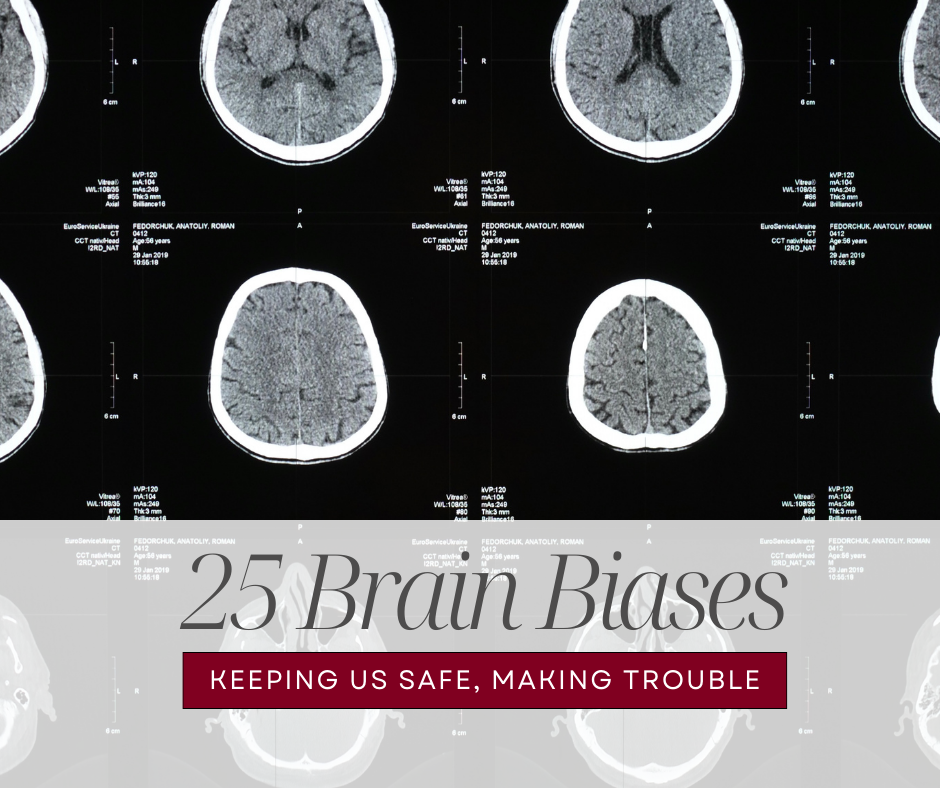25 Brain Biases: Our Mind’s Quirks That Help Us Survive but Get Us in Trouble
Brain biases, also known as cognitive biases, are systematic patterns of deviation from norm or rationality in judgment, often leading to perceptual distortion, inaccurate judgment, illogical interpretation, or what is broadly called irrationality. Here's list of some common brain biases:
1. Confirmation Bias: The tendency to seek, interpret, and remember information in a way that confirms one's preconceptions or beliefs, while ignoring or discounting contradictory evidence.
2. Availability Heuristic: Relying on easily available examples or information, rather than considering all relevant information, when making decisions or judgments.
3. Anchoring Bias: The tendency to rely heavily on the first piece of information encountered (the "anchor") when making decisions, even if it's irrelevant or arbitrary.
4. Overconfidence Bias: Overestimating one's own abilities, knowledge, or the accuracy of one's beliefs and predictions.
5. Hindsight Bias: The inclination to see events as having been predictable after they have already occurred, leading to an underestimation of uncertainty.
6. Dunning-Kruger Effect: Unskilled individuals tend to overestimate their own competence, while highly skilled individuals may underestimate their own competence.
7. Self-Serving Bias: The tendency to attribute positive events to one's own character or abilities, but attribute negative events to external factors.
8. Sunk Cost Fallacy: Continuing a behavior or decision based on the investment already made, despite evidence that it's no longer the best choice.
9. Gambler's Fallacy: Believing that future probabilities are altered by past events, particularly in games of chance.
10. Framing Effect: Decisions are influenced by how choices are presented or framed, even if the underlying information is the same.
11. Status quo Bias: Preferring things to stay the same rather than change, even when change could be beneficial.
12. Endowment Effect: Overvaluing things simply because one owns them, leading to inflated pricing in economic transactions.
13. Negativity Bias: Giving more weight to negative information or experiences than positive ones, leading to a skewed perception of reality.
14. Bandwagon Effect: Adopting certain behaviors or beliefs because many others are doing so, often without critical examination.
15. Social Proof: Relying on others' actions and opinions to determine appropriate behavior or beliefs.
16. Illusion of Control: Believing that one has more control over events or outcomes than is actually the case.
17. Authority Bias: Giving undue weight to the opinions or actions of authority figures or experts, without proper scrutiny.
18. Primacy and Recency Effects: Remembering the first and last items in a list better than the items in the middle.
19. Anchoring Bias: Being overly influenced by initial information or numbers presented when making decisions, even if they're unrelated.
20. In-group Bias: Favoring one's own group over others, leading to prejudice and discrimination.
21. Halo Effect: Forming an overall positive impression of a person based on a single positive trait.
22. False Consensus Effect: Assuming that one's own beliefs, attitudes, or opinions are more common among others than they actually are.
23. Fundamental Attribution Error: Tendency to attribute others' behavior to internal characteristics while ignoring external factors.
24. Self-fulfilling Prophecy: Believing in and acting according to a certain outcome, which then leads to that outcome coming true.
25. Just-world Hypothesis: Believing that good things happen to good people and bad things happen to bad people, which may lead to victim-blaming.
These biases are natural shortcuts that our brains use to process information efficiently. However, being aware of them can help you make more rational and informed decisions. Think about how these might be influencing how you live day-to-day and their impact on your relationships.
I am a PhD in Clinical Sexology candidate at Modern Sex Therapy Institutes and have a Master of Science in Educational Psychology. I work with individuals, couples, non-monogamous relationships, and groups in topics related to sexuality, emotional regulation, communication dynamics, and changing behaviors.


